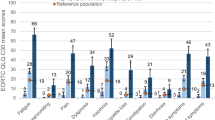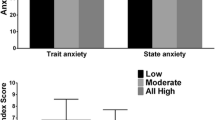Abstract
Purpose
Higher symptom burden in oncology patients is associated with poorer quality of life (QOL). However, the long-term predictive relationship between pre-treatment symptom profiles and QOL is unknown. The aim of this study was to identify subgroups of breast cancer patients based on their presurgical symptom profiles and to examine the predictive effect of group membership on QOL 2 years after surgery.
Methods
Data were analyzed from a longitudinal study of women’s (N = 198) symptoms after breast cancer surgery. Patient subgroups were identified by latent class analysis based on presurgical severity of five symptoms (i.e., attentional and physical fatigue, sleep disturbance, depression, and anxiety). Among these 198 women, quality of life 2 years after surgery was available for 97. Group differences in QOL were examined by general linear models.
Results
We identified four distinct patient groups. Group A (All Low) had low levels of all symptoms. Group B (Low Fatigue and Moderate Mood) was characterized by low attentional and physical fatigue but moderate sleep disturbance, depression, and anxiety. Group C (All Moderate) was characterized by moderate levels of all five symptoms. Group D was characterized by moderate attentional and physical fatigue and severe sleep disturbance, depression, and anxiety (Moderate Fatigue and High Mood). Group D had significantly lower overall QOL scores 2 years after surgery than Group A (p = 0.002).
Conclusions
Breast cancer patients’ presurgical symptom profile had a long-term predictive effect on QOL. Routine assessment of patients’ pre-treatment symptom is suggested to identify high risk group.

Similar content being viewed by others
References
Liao M-N, Chen M-F, Chen S-C, Chen P-L (2008) Uncertainty and Anxiety During the Diagnostic Period for Women With Suspected Breast Cancer. Cancer Nurs 31: 274-283
Arndt V, Stegmaier C, Ziegler H, Brenner H (2006) A population-based study of the impact of specific symptoms on quality of life in women with breast cancer 1 year after diagnosis. Cancer 107:2496–2503
Engel J, Kerr J, Schlesinger-Raab A, Eckel R, Sauer H, Hölzel D (2003) Predictors of quality of life of breast cancer patients. Acta Oncol 42:710–718
Cheng KK, Lee DT (2011) Effects of pain, fatigue, insomnia, and mood disturbance on functional status and quality of life of elderly patients with cancer. Crit Rev Oncol Hematol 78:127–137
Dodd M, Janson S, Facione N, Faucett J, Froelicher ES, Humphreys J, Lee K, Miaskowski C, Puntillo K, Rankin S, Taylor D (2001) Advancing the science of symptom management. J Adv Nurs 33:668–676
Dodd MJ, Miaskowski C, Paul SM (2001) Symptom clusters and their effect on the functional status of patients with cancer. Oncol Nurs Forum 28:465–470
Chen ML, Tseng HC (2006) Symptom clusters in cancer patients. Support Care Cancer 14:825–830
Thomas BC, Waller A, Malhi RL, Fung T, Carlson LE, Groff SL, Bultz BD (2014) A longitudinal analysis of symptom clusters in cancer patients and their sociodemographic predictors. J Pain Symptom Manag 47:566–578
Bender CM, Ergyn FS, Rosenzweig MQ, Cohen SM, Sereika SM (2005) Symptom clusters in breast cancer across 3 phases of the disease. Cancer Nurs 28:219–225
Cheung WY, Le LW, Zimmermann C (2009) Symptom clusters in patients with advanced cancers. Support Care Cancer 17:1223–1230
Hird A, Wong J, Zhang L, Tsao M, Barnes E, Danjoux C, Chow E (2010) Exploration of symptoms clusters within cancer patients with brain metastases using the spitzer quality of life index. Support Care Cancer 18:335–342
Miaskowski C, Cooper BA, Paul SM, Dodd M, Lee K, Aouizerat BE, West C, Cho M, Bank A (2006) subgroups of patients with cancer with different symptom experiences and quality-of-life outcomes: a cluster analysis. Oncol Nurs Forum 33:E79–E89
Pud D, Ben Ami S, Cooper BA, Aouizerat BE, Cohen D, Radiano R, Naveh P, Nikkhou-Abeles R, Hagbi V, Kachta O, Yaffe A, Miaskowski C (2008) The symptom experience of oncology outpatients has a different impact on quality-of-life outcomes. J Pain Symptom Manag 35:162–170
Dodd MJ, Cho MH, Cooper BA, Miaskowski C (2010) The effect of symptom clusters on functional status and quality of life in women with breast cancer. Eur J Oncol Nurs 14:101–110
Ferreira KA, Kimura M, Teixeira MJ, Mendoza TR, da Nobrega JC, Graziani SR, Takagaki TY (2008) Impact of cancer-related symptom synergisms on health-related quality of life and performance status. J Pain Symptom Manag 35:604–616
Kim HJ, Barsevick AM, Beck SL, Dudley W (2012) Clinical subgroups of a psychoneurologic symptom cluster in women receiving treatment for breast cancer: a secondary analysis. Oncol Nurs Forum 39:E20–E30
Liu L, Fiorentino L, Natarajan L, Parker BA, Mills PJ, Sadler GR, Dimsdale JE, Rissling M, He F, Ancoli-Israel S (2009) Pre-treatment symptom cluster in breast cancer patients is associated with worse sleep, fatigue and depression during Chemotherapy. Psychooncology 18:187–194
Bower JE (2008) Behavioral symptoms in patients with breast cancer and survivors. J Clin Oncol 26:768–777
Lehto RH, Cimprich B (1999) Anxiety and directed attention in women awaiting breast cancer surgery. Oncol Nurs Forum 26:767–772
Liao MN, Chen MF, Chen SC, Chen PL (2008) Uncertainty and anxiety during the diagnostic period for women with suspected breast cancer. Cancer Nurs 31:274–283
Chen ML, Miaskowski C, Liu LN, Chen SC (2012) Changes in perceived attentional function in women following breast cancer surgery Breast Cancer Res Treat 131:599–606
Huang HP, Chen ML, Liang J, Miaskowski C (2014) Changes in and predictors of severity of fatigue in women with breast cancer: a longitudinal study. Int J Nurs Stud 51:582–592
Liu LN, Wen FH, Miaskowski C, Lin YC, Wang JS, Jeng C, Chen ML (2014) Weight change trajectory in women with breast cancer receiving chemotherapy and the effect of different regimens. J Clin Nurs 23:2757–2768
Cimprich B (1992) Attentional fatigue following breast cancer surgery. Res Nurs Health 15:199–207
Cimprich B, Visovatti M, Ronis DL (2011) The attentional function index–a self-report cognitive Measure. Psychooncology 20:194–202
Lee KA, Hicks G, Nino-Murcia G (1991) Validity and reliability of a scale to assess fatigue. Psychiatry Res 36:291–298
Miaskowski C, Lee KA (1999) Pain, fatigue, and sleep disturbances in oncology outpatients receiving radiation therapy for bone metastasis: a pilot study. J Pain Symptom Manag 17:320–332
Fletcher BS, Paul SM, Dodd MJ, Schumacher K, West C, Cooper B, Lee K, Aouizerat B, Swift P, Wara W, Miaskowski CA (2008) Prevalence, severity, and impact of symptoms on female family caregivers of patients at the initiation of radiation therapy for prostate cancer. J Clin Oncol 26:599–605
Lee KA (1992) Self-reported sleep disturbances in employed women Sleep 15: 493–498
Van Onselen C, Cooper BA, Lee K, Dunn L, Aouizerat BE, West C, Dodd M, Paul S, Miaskowski C (2012) Identification of distinct subgroups of breast cancer patients based on self-reported changes in sleep disturbance. Support Care Cancer 20:2611–2619
Radloff LS (1977) The CES-D scale: a self-report depression scale for research in the general population. Appl Psychol Meas 1:385–401
Hann D, Winter K, Jacobsen P (1999) Measurement of depressive symptoms in cancer patients: evaluation of the center for epidemiological studies depression scale (CES-D). J Psychosom Res 46:437–443
Spielberger CG, Gorsuch RL, Suchene R, Vagg PR, Jacobs GA (1983) Manual for the state-trait anxiety inventory (form Y). Consulting Psychologists Press, Palo Alto
Novy DM, Nelson DV, Goodwin J, Rowzee RD (1993) Psychometric comparability of the state-trait anxiety inventory for different ethnic subpopulations. Psychol Assess 5:343–349
Ferrell BR, Dow KH, Grant M (1995) Measurement of the quality of life in cancer survivors. Qual Life Res 4:523–531
Ferrell BR, Grant M Quality of Life Patient/Cancer Survivor Version. Retrieved from http://prc.coh.org/QOL-CS.pdf
Chen L-M (2007) The influence of pain beliefs/attitudes on pain experience among advanced cancer patients in Taiwan. Doctoral dissertation. University of California, San Francisco
Bland JM, Altman DG (1995) Multiple significance tests: the bonferroni method. BMJ 310:170
Merriman JD, Dodd M, Lee K, Paul SM, Cooper BA, Aouizerat BE, Swift PS, Wara W, Dunn L, Miaskowski C (2011) Differences in self-reported attentional fatigue between patients with breast and prostate cancer at the initiation of radiation therapy. Cancer Nurs 34:345–353
Marcora SM, Staiano W, Manning V (2009) Mental fatigue impairs physical performance in humans J Appl Physiol (1985) 106: 857-864
Acknowledgments
This study was supported by a research grant to Dr. Mei-Ling Chen from the National Science Council of Taiwan (grant number: NSC 94–2314-B-182–025, NSC 95–2314-B-182–005, NSC 96–2628-B-182–032).
Conflict of interest
The authors declare that they have no conflict of interest.
Ethical approval
“All procedures performed in studies involving human participants were in accordance with the ethical standards of the institutional and/or national research committee and with the 1964 Helsinki declaration and its later amendments or comparable ethical standards.”
Author information
Authors and Affiliations
Corresponding author
Rights and permissions
About this article
Cite this article
Chen, ML., Liu, LN., Miaskowski, C. et al. Presurgical symptom profiles predict quality of life 2 years after surgery in women with breast cancer. Support Care Cancer 24, 243–251 (2016). https://doi.org/10.1007/s00520-015-2784-8
Received:
Accepted:
Published:
Issue Date:
DOI: https://doi.org/10.1007/s00520-015-2784-8




